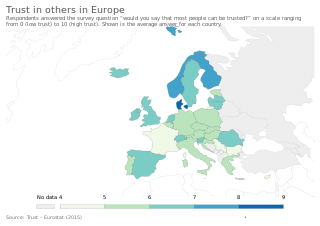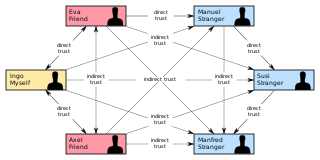
Security is freedom from, or resilience against, potential harm caused by others. Beneficiaries of security may be of persons and social groups, objects and institutions, ecosystems or any other entity or phenomenon vulnerable to unwanted change.
Social capital is "the networks of relationships among people who live and work in a particular society, enabling that society to function effectively". It involves the effective functioning of social groups through interpersonal relationships, a shared sense of identity, a shared understanding, shared norms, shared values, trust, cooperation, and reciprocity. Social capital is a measure of the value of resources, both tangible and intangible, and the impact that these relationships have on the resources involved in each relationship, and on larger groups. It is generally seen as a form of capital that produces public goods for a common purpose.

Guanxi defines the fundamental dynamic in personalized social networks of power, and is a crucial system of beliefs in Chinese culture. In Western media, the pinyin romanization of this Chinese word is becoming more widely used instead of the two common translations of it—"connections" and "relationships"—as neither of those terms sufficiently reflects the wide cultural implications that guanxi describes.
Organization development (OD) is the study and implementation of practices, systems, and techniques that affect organizational change. The goal of which is to modify an organization's performance and/or culture. The organizational changes are typically initiated by the group's stakeholders. OD emerged from human relations studies in the 1930s, during which psychologists realized that organizational structures and processes influence worker behavior and motivation. More recently, work on OD has expanded to focus on aligning organizations with their rapidly changing and complex environments through organizational learning, knowledge management, and transformation of organizational norms and values. Key concepts of OD theory include: organizational climate, organizational culture and organizational strategies.
Cross-cultural communication is a field of study that looks at how people from differing cultural backgrounds communicate, in similar and different ways among themselves, and how they endeavor to communicate across cultures. Intercultural communication is a related field of study.
The reputation of a social entity is an opinion about that entity typically as a result of social evaluation on a set of criteria, such as behaviour or performance.

Trust exists in interpersonal relationships. Humans have a natural disposition to trust and to judge trustworthiness. This can be traced to the neurobiological structure and activity of a human brain. Some studies indicate that trust can be altered e.g. by the application of oxytocin.

In psychology and sociology, a trust metric is a measurement or metric of the degree to which one social actor trusts another social actor. Trust metrics may be abstracted in a manner that can be implemented on computers, making them of interest for the study and engineering of virtual communities, such as Friendster and LiveJournal.

Distrust is a formal way of not trusting any one party too much in a situation of grave risk or deep doubt. It is commonly expressed in civics as a division or balance of powers, or in politics as means of validating treaty terms. Systems based on distrust simply divide the responsibility so that checks and balances can operate. The phrase "trust, but verify" refers specifically to distrust.
In marketing, promotion refers to any type of marketing communication used to inform target audiences of the relative merits of a product, service, brand or issue, most of the time persuasive in nature. It helps marketers to create a distinctive place in customers' mind, it can be either a cognitive or emotional route. The aim of promotion is to increase awareness, create interest, generate sales or create brand loyalty. It is one of the basic elements of the market mix, which includes the four Ps, i.e., product, price, place, and promotion.
Internet identity (IID), also online identity or internet persona, is a social identity that an Internet user establishes in online communities and websites. It can also be considered as an actively constructed presentation of oneself. Although some people choose to use their real names online, some Internet users prefer to be anonymous, identifying themselves by means of pseudonyms, which reveal varying amounts of personally identifiable information. An online identity may even be determined by a user's relationship to a certain social group they are a part of online. Some can even be deceptive about their identity.

Organizational architecture has two very different meanings. In one sense it literally refers to the organization's built environment and in another sense it refers to architecture metaphorically, as a structure which fleshes out the organizations. The various features of a business's organizational architecture has to be internally consistent in strategy, architecture and competitive environment.
Media transparency, also referred to as Media Opacity, is a concept that explores how and why information subsidies are being produced, distributed and handled by media professionals, including journalists, editors, public relations practitioners, government officials, public affairs specialists, and spokespeople. In short, media transparency reflects the relationship between civilization and journalists, news sources and government. According to a textual analysis of “Information Subsidies and Agenda Building: A Study of Local Radio News”, an information subsidy is defined as “any item provided to the media in order to gain time or space”. In order to understand media transparency, one must gain an understanding of the different aspects in which media transparency is researched, understood, and explored. The following page will attempt to examine media transparency as it has grown and how it affects the modern world.

Social entrepreneurship is an approach by individuals, groups, start-up companies or entrepreneurs, in which they develop, fund and implement solutions to social, cultural, or environmental issues. This concept may be applied to a wide range of organizations, which vary in size, aims, and beliefs. For-profit entrepreneurs typically measure performance using business metrics like profit, revenues and increases in stock prices. Social entrepreneurs, however, are either non-profits, or they blend for-profit goals with generating a positive "return to society". Therefore, they use different metrics. Social entrepreneurship typically attempts to further broad social, cultural and environmental goals often associated with the voluntary sector in areas such as poverty alleviation, health care and community development.
Knowledge sharing is an activity through which knowledge is exchanged among people, friends, peers, families, communities, or within or between organizations. It bridges the individual and organizational knowledge, improving the absorptive and innovation capacity and thus leading to sustained competitive advantage of companies as well as individuals. Knowledge sharing is part of the Knowledge management process.
In information security, computational trust is the generation of trusted authorities or user trust through cryptography. In centralised systems, security is typically based on the authenticated identity of external parties. Rigid authentication mechanisms, such as public key infrastructures (PKIs) or Kerberos, have allowed this model to be extended to distributed systems within a few closely collaborating domains or within a single administrative domain. During recent years, computer science has moved from centralised systems to distributed computing. This evolution has several implications for security models, policies and mechanisms needed to protect users’ information and resources in an increasingly interconnected computing infrastructure.
Cynicism is an attitude characterized by a general distrust of others' motives. A cynic may have a general lack of faith or hope in people motivated by ambition, desire, greed, gratification, materialism, goals, and opinions that a cynic perceives as vain, unobtainable, or ultimately meaningless and therefore deserving of ridicule or admonishment. The term originally derives from the ancient Greek philosophers, the Cynics, who rejected conventional goals of wealth, power, and honor. They practiced shameless nonconformity with social norms in religion, manners, housing, dress, or decency, instead advocating the pursuit of virtue in accordance with a simple and natural way of life.

Naïve cynicism is a philosophy of mind, cognitive bias and form of psychological egoism that occurs when people naïvely expect more egocentric bias in others than actually is the case.

For the last several decades research in cross-cultural psychology has focused on the cultural patterning and positioning of values. Unfortunately, values have low predictive power for actual behavior. Researchers at the Chinese University of Hong Kong decided to develop a questionnaire to measure beliefs, i.e., what is believed to be true about the world, to add to the power of values, i.e., what the person believes is valuable, in predicting behavior.
Trust capital refers to the established trustworthiness of an entity, considered as a resource which is gained or spent through various activities.








